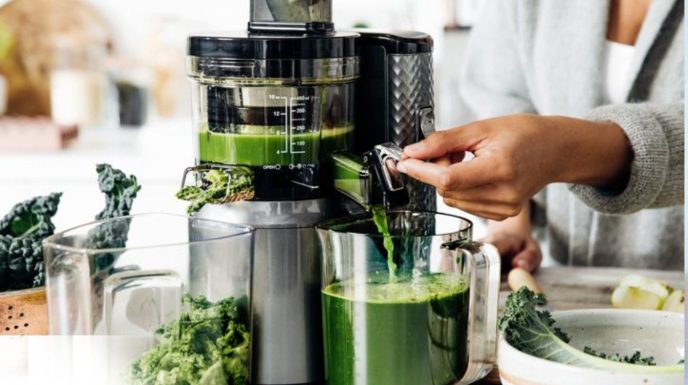The cold press juicer, also known as a masticating juicer, has taken the health and wellness world by storm with its ability to extract juice from fruits and vegetables using a gentle, slow process. Unlike traditional centrifugal juicers that use high-speed grinding and spinning actions that can generate heat and destroy some nutrients in the process, cold press juicers operate at a slower pace, effectively preserving vital enzymes and essential vitamins. This method leads to higher juice quality, increased yield, and longer shelf life without compromising on nutritional value.
Cold press juicers are a popular kitchen appliance that allow you to extract juice from fruits and vegetables in a slow, gentle process. This method of juicing preserves more of the nutrients and enzymes found in fresh produce, resulting in a healthier and more flavorful juice. If you’re new to cold press juicing and want to know how to make the most of your juicer, this article will provide you with a comprehensive guide on how to use a cold press juicer effectively.
How to Use a Cold Press Juicer?

What is a Cold Press Juicer?
A cold press juicer operates slowly, using a masticating or chewing action to extract juice from fruits and vegetables. Unlike traditional centrifugal juicers, cold press juicers produce juice by slowly crushing and squeezing the produce, preserving more nutrients and enzymes.
Here’s a step-by-step guide on how to use a cold press juicer.
1. Preparing the Produce
Before you begin juicing, it’s important to properly prepare your fruits and vegetables. Start by washing them thoroughly to remove any dirt or debris. If necessary, peel or remove any seeds or pits. Cut the produce into small, manageable pieces that will fit easily into the juicer’s chute.
2. Assembling the Juicer
Next, assemble the juicer according to the manufacturer’s instructions. This typically involves attaching the juicing screen and the juice collection container. Make sure that all parts are securely in place before you begin juicing.
3. Juicing
Once the juicer is assembled, turn it on and begin feeding the produce into the chute. Use the pusher to gently press the produce down into the juicing screen. The juice will be extracted and collected in the container, while the pulp will be discharged into a separate container.
4. Cleaning
After juicing, it’s important to clean the juicer thoroughly to prevent the buildup of bacteria and mold. Start by unplugging the juicer and disassembling it. Rinse all parts with water and use a brush or sponge to remove any remaining bits of pulp. Dry the parts completely before reassembling the juicer and storing it away.
Benefits of Using a Cold Press Juicer
- Retains more nutrients: The slow juicing process minimizes heat and oxidation, preserving vital nutrients, vitamins, and enzymes in the juice.
- Higher juice yield: Cold press juicers extract more juice from the same produce as other juicers.
- Longer shelf life: Fresh juice made with a cold press juicer can be stored for up to 72 hours without significantly losing quality or nutritional value.
- Versatile juicing capabilities: Cold press juicers can handle various fruits, vegetables, leafy greens, and wheatgrass.
Operating Your Cold Press Juicer
Operating a cold press juicer is a simple yet rewarding process that allows you to extract the maximum nutrients from your fruits and vegetables. To start, assemble the juicer by placing all components in their proper positions. Next, prepare your produce by washing and cutting them into smaller pieces to fit through the juicer’s feed chute. When feeding the ingredients into the machine, it’s important to alternate between soft and hard items to ensure efficient extraction.
Once your ingredients are in place, gently push them through the chute using the provided plunger. Unlike traditional juicers that use high-speed blades or centrifugal force, cold press juicers operate at low speeds and apply pressure to crush and squeeze the ingredients. This slow process minimizes heat production, preserving more enzymes and nutrients in your juice. After completing the extraction, clean up is a breeze – disassemble the parts and rinse them with warm soapy water for easy maintenance of your cold press juicer.
I hope these insights provide you with a fresh perspective on operating your cold press juicer. Remember to experiment with different produce combinations to create delicious and nutritious juices while getting familiar with this exciting kitchen tool!
Tips for Cleaning and Maintenance
Cleaning and maintaining your cold press juicer is crucial for ensuring its longevity and efficiency. To start, always refer to the manufacturer’s cleaning instructions to avoid damaging any delicate parts. When disassembling the juicer for cleaning, take note of how each component fits together to make reassembly easier. Utilize a small brush or toothbrush to remove pulp from hard-to-reach areas, and consider using a natural cleaning solution such as a mixture of water and vinegar to keep the juicer fresh and free of residue.
Additionally, regular maintenance is key in preventing clogs and keeping your cold press juicer running smoothly. After each use, remember to promptly clean components like the mesh strainer and auger, as allowing juice residue to dry can lead to stubborn buildup. Finally, store your cold press juicer in a cool, dry place when not in use to prevent corrosion or mold growth. By following these tips for cleaning and maintenance, you’ll ensure that your cold press juicer remains in optimal condition for years of enjoyment.
FAQs On Cold Press Juicer
How long does the juice stay fresh?
The juice can be stored in an airtight container in the refrigerator for up to 72 hours. However, it is recommended to consume it as soon as possible to get the maximum nutritional value.
Can I juice leafy greens?
Yes, leafy greens such as spinach, kale, and chard can be juiced using a cold press juicer. They are a great source of vitamins and minerals and can be mixed with other fruits and vegetables for a flavorful juice.
Can I juice hard fruits and vegetables?
Yes, hard fruits and vegetables such as apples, carrots, and beets can be juiced using a cold press juicer. However, they may require more effort to press and may produce less juice than softer fruits and vegetables.
Can I make nut milk with a cold press juicer?
No, a cold press juicer is not designed to make nut milk. A separate appliance, such as a nut milk bag or a high-speed blender, is needed to make nut milk.
How often do I need to clean my cold press juicer?
It is recommended to clean the juicer after every use to prevent the buildup of bacteria and mold. However, if you’re juicing multiple times a day, you can clean it after each juicing session.
Can I juice frozen fruits and vegetables?
No, frozen fruits and vegetables should not be juiced as they can damage the juicing screen and affect the quality of the juice. It is recommended to thaw frozen fruits and vegetables before juicing.
Can I juice citrus fruits?
Yes, citrus fruits such as oranges, lemons, and limes can be juiced using a cold press juicer. However, it is recommended to remove the rind and seeds before juicing as they can add a bitter taste to the juice.
Conclusion
Juicing is a great way to incorporate more fruits and vegetables into your diet. A cold press juicer is a great investment for anyone who wants to make healthy and delicious juice at home. By following these steps, you can be sure that you’re getting the most out of your cold press juicer and enjoying the freshest, most nutritious juice possible.
Embracing a healthy lifestyle with cold press juicing is not just about consuming trendy drinks, but rather a transformative approach to overall well-being. The slow and gentle extraction process of cold press juicers ensures that essential nutrients, enzymes, and antioxidants are preserved, offering a powerful way to nourish your body. By incorporating a variety of fruits, vegetables, and herbs into your cold press juicing routine, you can personalize your nutrition intake and boost your immune system.

